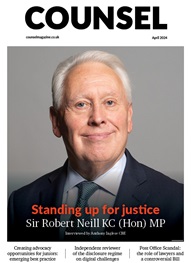*/
Trial management
The Justices of the Supreme Court have taken part in a paper-saving “test case” that could eventually see more than 1.25 million sheets of paper saved every year.
Sitting as the Judicial Committee of the Privy Council, they heard a five-day multi-million dollar damages’ claim that would normally have required up to 100,000 printed sheets of paper. Instead the court used an electronic system for sharing documents, and counsel and Justices navigated their way through a file of more than 18,000 pages. A monitor was controlled by a member of the relevant solicitors’ team, to display the page to which the advocate was referring.
Lord Kerr said: “Cases before the Supreme Court and the Judicial Committee of the Privy Council customarily generate a considerable amount of written material.
“The increasing use of technology will not only reduce the volume of papers but will lead to a more focused and economical presentation of appeals. It will be some time, of course, before all appeals are presented by using computers but a good start has been made.”
Sitting as the Judicial Committee of the Privy Council, they heard a five-day multi-million dollar damages’ claim that would normally have required up to 100,000 printed sheets of paper. Instead the court used an electronic system for sharing documents, and counsel and Justices navigated their way through a file of more than 18,000 pages. A monitor was controlled by a member of the relevant solicitors’ team, to display the page to which the advocate was referring.
Lord Kerr said: “Cases before the Supreme Court and the Judicial Committee of the Privy Council customarily generate a considerable amount of written material.
“The increasing use of technology will not only reduce the volume of papers but will lead to a more focused and economical presentation of appeals. It will be some time, of course, before all appeals are presented by using computers but a good start has been made.”
Trial management
The Justices of the Supreme Court have taken part in a paper-saving “test case” that could eventually see more than 1.25 million sheets of paper saved every year.


Sam Townend KC explains the Bar Council’s efforts towards ensuring a bright future for the profession
Giovanni D’Avola explores the issue of over-citation of unreported cases and the ‘added value’ elements of a law report
Louise Crush explores the key points and opportunities for tax efficiency
Westgate Wealth Management Ltd is a Partner Practice of FTSE 100 company St. James’s Place – one of the top UK Wealth Management firms. We offer a holistic service of distinct quality, integrity, and excellence with the aim to build a professional and valuable relationship with our clients, helping to provide them with security now, prosperity in the future and the highest standard of service in all of our dealings.
Is now the time to review your financial position, having reached a career milestone? asks Louise Crush
If you were to host a dinner party with 10 guests, and you asked them to explain what financial planning is and how it differs to financial advice, you’d receive 10 different answers. The variety of answers highlights the ongoing need to clarify and promote the value of financial planning.
Most of us like to think we would risk our career in order to meet our ethical obligations, so why have so many lawyers failed to hold the line? asks Flora Page
If your current practice environment is bringing you down, seek a new one. However daunting the change, it will be worth it, says Anon Barrister
Creating advocacy opportunities for juniors is now the expectation but not always easy to put into effect. Tom Mitcheson KC distils developing best practice from the Patents Court initiative already bearing fruit
Sam Townend KC explains the Bar Council’s efforts towards ensuring a bright future for the profession
The long-running fee-paid judicial pensions saga continues. The current cut-off date for giving notice of election to join FPJPS is 31 March 2024, and that date now gives rise to a serious problem, warns HH John Platt